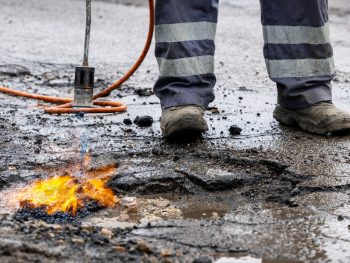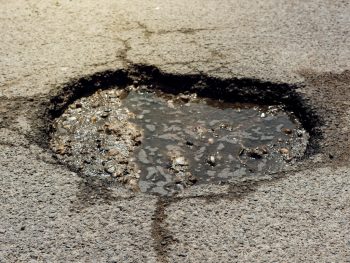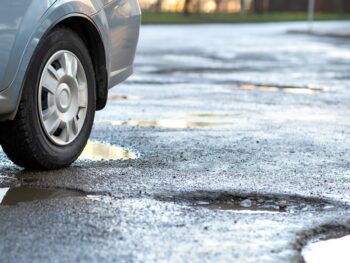Cost of pothole damage to vehicles hits new high
Pothole damage to vehicles cost UK drivers a whopping £579m in 2024, hitting a new high.

Pothole-related breakdowns jumped by almost a fifth (17%) in the final quarter of 2024
Published to mark National Pothole Day (15 January), the AA’s Pothole Index statistics reveal its patrols attended 643,318 pothole-related incidents in 2024, down 0.7% on 2023. But the average cost of repairs rose from £250 to £300, pushing the annual bill up to £579m in 2024, compared to £474m in 2023. The rise in repair costs is due to inflation, delays in the parts supply chain and more advanced technology within cars.
RAC’s own Pothole Index also paints a grim picture of the ongoing poor condition of Britain’s roads; its figures show that pothole-related breakdowns jumped by almost a fifth (17%) in the final three months of 2024 compared to the previous quarter.
RAC patrols went to the rescue of 4,709 drivers from October to December for damaged shock absorbers, broken suspension springs or distorted wheels – the callouts most likely to be caused by wear and tear from defective road surfaces. This was 669 more than the 4,040 recorded in the third quarter of 2024. That’s despite mild, drier weather which usually means new potholes are less likely.
The RAC has also warned that the number of pothole breakdowns could increase even more in 2025 following the recent severe weather conditions. The breakdown recovery specialist said last week was one of its busiest periods for breakdowns in the five years since the Covid pandemic.
The figures follow last month’s government announcement of a record £1.6bn investment to fill potholes and repair roads across England for 2025/26. The figure includes the £500m uplift in funding pledged in the Autumn Budget and is up nearly 50% on local road maintenance funding from last year.
The extra funding follows Labour’s manifesto commitment to fix an additional one million potholes a year – the uprated investment is actually enough to fix the equivalent of over seven million extra potholes in 2025/2026.
The RAC has called on local highways authorities to resurface those in the worst condition and surface dress other roads to stop them deteriorating further.
RAC Breakdown spokesperson Alice Simpson said: “Hopefully the government funding announced before Christmas will go some way towards literally filling in the cracks, giving road users smoother, safer surfaces. The £1.6bn allocated to pothole repairs is the biggest one-off road maintenance settlement councils in England have ever been given.”
Meanwhile, the AA, along with other members of the Pothole Partnership, is pressing local authorities to up their game by investing in better technology along with proactive repairs.
The recent government announcement on extra funds to fix local roads in England made reference to 25% of funds being withheld until local authorities proved they are delivering more proactive maintenance and getting away from the ‘patchwork’ approach.
The Pothole Partnership said it was a welcome move and has urged councils to make permanent repairs a priority over temporary fixes.

The Pothole Partnership has urged councils to make permanent repairs a priority over temporary fixes.
A recent Freedom of Information Requests by the Partnership found the whole system of local authority repair standards confusing. Local authorities have 78 different ways of measuring the effectiveness of their pothole repairs. One local authority even admits that they don’t bother measuring the longevity of their repairs, underlining the wide chasm between the best and the worst.
The Asphalt Industry Alliance (AIA) has also warned that the challenge to improve the condition of the UK’s local road network goes beyond simply filling in potholes.
The AIA’s 2024 Annual Local Authority Road Maintenance (ALARM) survey found that local road conditions are at an all-time low due to decades of underfunding and that it would now cost more than £16bn to tackle the backlog of repairs across England and Wales.
David Giles, chair of the AIA, said: “If we want to see improved conditions, local authorities need sustained, targeted and accountable funding – provided on both a needs and improvement basis – over the long term. This would allow highway engineers to carry out the right maintenance and repair interventions at the right time – delivering better value for money for the public funds allocated and helping to ensure we have a local road network that is safe, keeps people connected and supports economic growth.”
Future of Roads Minister Lilian Greenwood said today that the Government is investing to boost infrastructure and to tackle the pothole plague to get Britain moving.
Greenwood marked National Pothole Day with a visit to the JCB Factory outside Derby, to see latest technology helping councils tackle potholes. This includes JCB’s ‘Pothole Pro’. Currently used in 20 local authorities, this machine can fix a pothole in eight minutes, with a cost of around £30.
Greenwood said: “JCB’s Pothole Pro is one of the many great examples of using new technology to repair potholes faster and demonstrates how companies are harnessing new technology to repair potholes faster.
“We’ll continue to engage with local leaders and industry to ensure innovations are being used to deliver roads the country deserves.”
Over a quarter of motorists concerned by potholes in 2025
More than a quarter of drivers (27%) say they’re concerned by potholes damaging their vehicle in the next 12 months, according to research from Close Brothers Motor Finance.

Potholes ranked three in the list of top driver concerns
The survey asked motorists about their biggest concerns over the next 12 months – and potholes ranked three in the list. Rising fuel prices came in second with over a third (35%) feeling concerned, whilst car insurance hikes were in pole position for just under two fifths (37%). Other concerns include MOT / servicing costs (24%) and road tax hikes (19%).
Biggest concerns in the next 12 months:
Car insurance hikes – 37%
Rising fuel prices – 35%
Potholes damaging the vehicle – 27%
MOT / servicing costs – 24%
Road tax hikes – 19%
Cost of purchasing a new car – 16%
Further crackdowns on petrol/diesel vehicles – 12%
Not being able to afford the running costs – 14%
Parking charges increasing – 12%
High second-hand car prices – 9%
Introduction of ULEZ/similar schemes – 8%
Lack of infrastructure development, such as charging points – 7%
Not picking the right choice of vehicle for my needs – 6%
Losing the incentives that currently exist for AFV owners – 4%
Having to lend/share my vehicle with someone else i.e. my partner or children – 4%
John Cassidy, managing director of sales at Close Brothers Motor Finance, said: “Potholes can cause significant damage to vehicles and cost drivers a fortune to fix – made worse during the winter months. Motorists will be hoping that the Government’s promised investment to fix potholes is adequate enough to fully support much-needed improvements.”
Nextbase launches new tool for dashcam users to report potholes
Dashcam specialist Nextbase has chosen National Pothole Day to launch a new online tool for dashcam users to report potholes.

Nextbase’s new directory helps dashcam users easily submit evidence of potholes to local authorities
The new directory helps dashcam users easily submit evidence of potholes to local authorities.
The tool follows the success of the National Dashcam Safety Portal, which allows users to directly upload footage of dangerous drivers to local police forces and has amassed over 150,000 submissions over its five years of operation, and saved police over a century of time.
Nextbase head of road safety Bryn Brooker commented: “With over a million potholes across the UK, councils need all the help they can get to identify problem areas quickly and efficiently.
“Our dashcam users are already out there recording this evidence every day and are eager to help make the roads safer, so we’re making it simple for them to put this data to good use. We are also working towards using dashcam technology to report directly and automatically to councils to help make potholes a thing of the past.”















